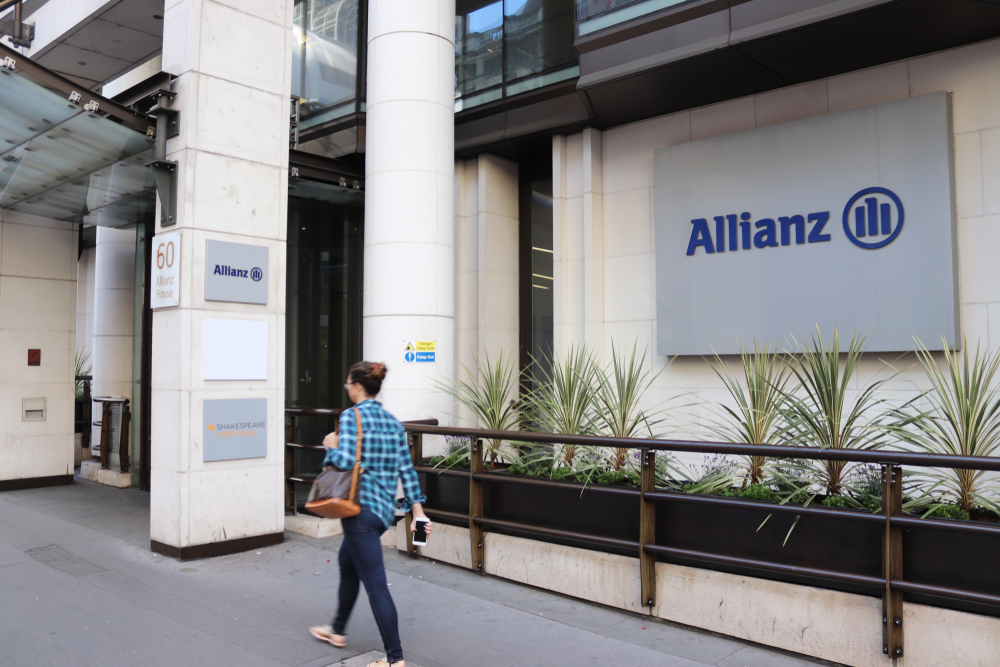Editor’s note: ImpactAlpha contributing editor Imogen Rose-Smith, a longtime senior writer for Institutional Investor, contributes a bi-weekly column on the policies, practices and strategies of the largest asset allocators, including pensions, foundations, and endowments. As Imogen says, she’s “tracking what investors do, not just what they say.”
ImpactAlpha, Feb. 14 – Last week, the FBI announced the arrest of a married couple, Ilya Lichtenstein, 34, and his wife, Heather Morgan, 31, for allegedly conspiring to launder $4.5 billion in cryptocurrencies.
Dubbed bitcoin’s Bonnie and Clyde by the feds, Morgan and Lichtenstein weren’t exactly hiding their good fortune. Morgan was a surly artist/rapper/journalist/activist, with a Twitter handle, YouTube channel, a Forbes column, and a TikTok account. She dubbed herself “The Crocodile of Wall Street.” Lichtenstein, a U.S. and Russian citizen, is a self-styled tech entrepreneur.
It’s the perfect crime for our times. At once both extremely serious – a $4.3 billion theft – and completely absurd. As Morgan’s fabulous rapper video went viral (watch it, you know you want to) it was reported that former President Donald Trump had repeatedly clogged his toilet with shredded documents. Russia’s faceoff with the U.S. and NATO over Ukraine tipped critical. COVID deaths surpassed 5.7 million.
This is the weird, sad, wonderful world we live in. It is one that faces massive social, economic, and environmental problems, with new challenges with every news cycle. Where only a few get rich, and the rest get left behind, making Morgan and Lichtenstein look like anti-heroes, sticking it to the man while the world goes up in smoke.
Solving the problems that face us it’s going to require billions, if not trillions, or dollars. Who’s got that kind of money? Institutional allocators, whose coffers have grown large indeed over the last two decades.
While more and more people are demanding more of major asset owners, institutional investors for the most part are not set up to solve global problems. Most believe that, as investment fiduciaries, it is not their job to worry about global, or local, problems, or even environmental, social and governance, or ESG, risks to their portfolios. Their job is to make money.
Firefighters and teachers
For decades, fiduciary duty has been seen as an impediment to the broader adoption of ESG and impact investing by large institutional asset owners such as pension plans and university endowments. In the bellwether case of pension funds covered by the federal ERISA, regulatory guidance has swung between allowing and forbidding consideration of ESG factors, from the Clinton to Bush to Obama to Trump administrations.
Now that pendulum has swung all the way back, with activists and other stakeholders arguing that allocators should take ESG factors into consideration because of their fiduciary duty. Regulators in the U.S., Europe, and the U.K. appear to be backing that assertion with recent actions recognizing the financial risks of climate change, as well as the material importance of environmental, social and governance practices.
These changes are great news, normalizing and even mandating the integration of ESG and impact in investment decision making.
I am not convinced, however, that the evolving definition of fiduciary duty can ever, or even potentially should ever, go far enough to open up the institutional money spigot to impact investing. Allocators still see ESG and impact as something imposed on the investment office by stakeholders, not something they make money on.
Unlike, say, the blockchain.
Blessing ESG as aligned with fiduciary duty is not going to transform the way allocators invest. ESG proponents need to win hearts and minds of chief investment officers through investment results, ram through new rules, or both.
Otherwise much of this activity runs the danger of just propping up the very status quo that needs to change if our future is to be sustainable. Creating the illusion of change
while failing to tackle the underlying systemic problems, and, worse, shoring up the institutions that helped create the deeper problems.
On the face of it, the risks associated with digital currencies (hacking, money laundering, fraud, human trafficking and more) would seem greater than, say, a signal to divest from a bit of Exxon stock. Many allocators do remain skeptical of crypto – bitcoin is volatile and overvalued, after all – but pretty much all fiduciary investors are at least thinking about dipping their toes, and sometimes their whole leg.
One of my favorite recent examples is investment in bitcoin by the Houston Firefighters’ Relief and Retirement Fund. “Some of the firefighters were asking the board why we don’t have Bitcoin,” Ajit Singh, CIO of the $5.2 billion pension plan, told Institutional Investor. “People were curious about it.”
So the firefighters of Houston are curious about bitcoin, and the investment office is all in. But if teachers of California want their pension divested from fossil fuels, we’re subject to years of discussion about fiduciary duty.
New York State to NYC: Drop dead
A fiduciary duty is a duty of care, to act in the best interests of another person or entity. In the hallowed halls of the investment office, this means that an institutional investor’s first and foremost responsibility is to ensure that funds are invested prudently and responsibly, putting the pursuit of the best possible risk-adjusted returns over other interests.
With regards to ESG and, before that, ethical or socially responsible investing, the application of that understanding of fiduciary duty has prevented allocators from making values-based investment decisions. While an allocator might personally care about, say, the working conditions at factories where laborers are making iPhones, that investor cannot as a result decide not to invest in Apple stock, unless (and this is the big but) there is a solid economic reason to do so.
The fact that institutional investors are fiduciaries is important. Fiduciary duty, and other rules, helps prevent the chief investment officer of a pension plan giving all of the money to her cousin to manage. It also prevents pension investment offices from directing all of their funds into deals that benefit their union members. Fiduciary duty is designed to ensure the protection and preservation of capital above anything else.
Among the best-known examples of applying these fiduciary principals occurred in New York in 1974. The city was on the verge of bankruptcy. The only option for a bailout (after President Ford famously refused to allow federal funds to be used) were pension dollars. The state teachers’ pension plan initially bought the bonds but then refused, citing fiduciary concerns. This precipitated a political crisis, in which resulted the teachers’ plan bought more of the city’s debt to keep it from bankruptcy.
The then-New York State Comptroller, and former SEC chair, Arthur Levitt, Sr, resisted pressures to put more than a modest amount of the state’s retirement assets into the city bonds. As sole trustee of the state retirement fund, Levitt cited fiduciary concerns.
In the end, NYC survived. But the incident demonstrated just how far the elastic of fiduciary duty can and can not stretch when political circumstances demand.
Ethics in investing
Two keystone documents for thinking about fiduciary duty as it relates to ESG, are the 1972 book, “The Ethical Investor,” and the Department of Labor’s guidance relating to the consideration of so-called non-financial factors in investment decision-making by pension fiduciaries regulated under the Employee Retirement Income Security Act of 1974, or ERISA.
“The Ethical Investor” gives institutional investors, and university endowments in particular, a roadmap for dealing with ethical issues when managing their portfolios.
Produced as a response to the divisive fight over divestment from companies doing business in apartheid South Africa, the book argues that it is OK for investment offices to consider ethical factors, but that these should be looked at separately from financial concerns. That effectively carved off areas such as proxy voting into side arms typically overseen by law professors and students or alumni.
It is important that “The Ethical Investor” was a Yale University Press publication, written by Yale professors. It makes the text something of a companion to “Pioneering Portfolio Management,” David Swenson’s 2000 book laying out the tenet of Modern Portfolio Theory.
As the long-time CIO of Yale University’s endowment, Swenson pioneered the modern approach to endowment investment. It is these endowment investors in particular who, when it comes to ESG, like to put their fingers in their ears saying “la la la fiduciary duty.”
The modern portfolio approach to investing argues against “taking ideas off the table” for anything other than financial factors. Tricky little things like ethics, and for a long time this included environmental concerns, were to be dealt with by the law professors and the ethicists over in the corner, away from the serious business of investing
Political football
How the Department of Labor thinks about ESG and impact investing is important to fiduciaries because the DOL is responsible for overseeing ERISA pension plans. Even pension, foundation, and endowment fiduciaries that are not ERISA fiduciaries look to the DOL’s oversight for guidance.
During the Obama Presidency, members of the impact investment community asked the DOL to issue new guidance with regards to the consideration of non-financial factors in investment decision-making for ERISA fiduciaries. The guidance that came out said, effectively that, all other things being equal, pension plans can consider non-financial factors such as climate change and job creation in their decision-making process.
The Employee Retirement Income Security Act of 1974 is the main act responsible for shaping much of the modern U.S. retirement landscape (among other things it heralded the advent of the 401(k) retirement fund and the end of corporate-defined benefit pensions). A 1979 ruling by the DOL allowed ERISA pension plans to invest in venture capital, ushering in the tech boom.
Impact investors were hoping that a change in ERISA guidance – making it explicit that ESG factors were allowed to be considered – would do the same thing for ESG and impact.
Then the Trump administration rolled back the DOL guidance and, in the closing months of 2020 went aggressively after ESG with rule changes. The Biden administration froze the Trump 2021 directives, and has signaled its own intent to revise the ESG guidance. And so it goes.
All this back and makes ESG and impact investment subject to the political winds blowing through Washington, even as the economic case for ESG investing, at least with regards to climate change, becomes all the more clear.
Everyone might have been better served by the DOL’s 1998 guidance relating to socially responsible investing issued in response to a Calvert Group question relating to socially responsible options in 401(k) plans. That guidance said fiduciary standards “do not preclude consideration of collateral benefits, such as those offered by a ‘socially-responsible’ fund,” as long as the investment can be expected to provide returns similar to alternatives with similar risk.
Times they are a-changin’
Live by the sword, die by the sword.
If the DOL has turned out to be an unreliable ally when it comes to questions of ESG and fiduciary duty, there are other regulators that have ESG proponents cheering.
Last year the SEC issued a request for comments regarding climate change disclosures. The U.S. Treasury Department has made it clear that climate change is a primary concern. Just Friday, DOL launched a request for actions regulators can take to protect retirement savings and pensions from climate-related financial risks. Even Biden’s latest Federal Reserve nominee has been outspoken about the need to address climate related financial risks.
Over in Europe, the European Union is requiring asset managers and asset owners to disclose how they include ESG considerations in their investing, or explain why they do not do so. And the U.K. is expected to make reporting under the Task Force for Climate Related Financial Risk Disclosure (TCFD) mandatory for all large companies and investors starting in April (assuming that policy doesn’t get sacrificed on the altar of #PartyGate and “Operation Save Big Dog”).
ESG advocates scored a clear victory in Australia at the end of 2020 in a landmark settlement agreement between one of the countries superannuation funds, Retail Employees Superannuation Trust, and a then 25-year-old pension beneficiary, Mark McVeigh. McVeigh had sued for breach of fiduciary duty over climate-change related concerns. The $47 billion Sidney-based pension saving plan agreed to enhanced monitoring and disclosure around climate related risks.
The social issues surrounding ESG are even more challenging than climate.
We have talked before about how the professionalization of the investment office disconnected the asset management from the pension beneficiaries whose retirement funds that office invests. That is how retirement funds come to be invested in private equity funds which strip away workers’ rights and discontinue defined-benefit plans (off loading, via bankruptcy, those same plans to the taxpayer.)
Under a narrow conception of fiduciary duty, a private equity investor generally has an obligation to find the funds which offer the best and highest returns, without concern about workers’ rights. Should that social mandate change?
On the one hand, allocators should have a fiduciary obligation to consider the broader economic impact of their investments, including that dismantling the middle class through a have and have-not economy is not in the best interest of pension beneficiaries, or society as a whole. Or that investing in inflationary assets, when your pension beneficiaries do not receive a cost of living adjustment (as is the case in Florida) does not benefit the people you serve.
On the other hand, forcing allocators to consider social factors tends to get sticky, particularly with regards to the public sector. That’s why New York City’s bankruptcy is such a salient lesson. It seems pretty obvious that you don’t want your pension plans bailing out your broken city (looking at you Detroit). We already have plenty of mandates requiring pension plans to invest in their own backyards (the Alberta Investment Management Co. for example). I’m not convinced we need or want more.
Prudent investor
While a legal term, the phrase fiduciary duty is not a magic spell. Allocators can’t waive their hands in the air, shout “fiduciary duty,” and use the words as an excuse to do nothing. (Although sometimes it might feel like that’s exactly what they do.) Similarly, ESG proponents can’t expect the growing acceptance of ESG as a fiduciary responsibility to suddenly and radically change how fund managers do their job.
Case in point: Divestment activists like to make the case that by investing in fossil fuels pension plans and endowments are in violation of their fiduciary duty. But recognizing the economic risks associated with climate change is not the same thing as divestment. Exxon stock rallied 48% in 2021; energy was last year’s the top performing sector in the S&P 500. What’s a good fiduciary to do?
The answer, of course, is to use her brain. The prudent man rule holds that a fiduciary is obligated to do what a prudent person would do. No more, and no less.
That definition is liberating, it allows allocators to walk and chew gum at the same time. I can decide that, all things being equal, I would prefer not to invest with the hedge fund manager headed up by someone whose principles I disagree with. Or to seek out fund managers with more organizational diversity.
The last two years has taught us that ethics and values don’t stop at the investment office door. That it’s ok to take into consideration diversity, equity, inclusion, and other factors when making investment decisions not purely for financial reasons (i.e. diverse teams perform better etc. etc.), but for moral and ethical reasons. A prudent investor can make that choice.
I’m obviously not an attorney. This is not legal advice. But we do not need to wait on the DOL to tell us what has always been true — invest in people whose values and moral compass you respect. (I’m also not an investment professional. This is not investment advice.)
Rather than assuming, as is so often the case, that the best way to go is just to invest with the biggest asshole in the room and watch him do his stuff. That approach can work. But we’ve all seen what happens when those particular chickens come home to roost (cough – Apollo – cough).
And making a bad investment, provided the right protocol was followed, does not necessarily put someone in violation of their fiduciary duty. It just makes them a bad investor. That’s not, unfortunately in some cases, illegal.
Satoshi Nakamoto
Which brings me back to crypto.
Bitcoin and impact investing were coined (I’ll see myself out) around the same time. The pseudonymous Satoshi Nakamoto published his white paper, “Bitcoin: A Peer-to-Peer Electronic Cash System,” in October of 2008, laying out the principles for establishing a decentralized system for trading money on the blockchain. The term “impact investing” was created out of two Rockefeller Foundation retreats in 2007 and 2008.
Bitcoin and impact both arguably responded to the growing sense of social inequality and unease, laid bare by the 2008 subprime mortgage and global credit crisis. Occupy Wall Street and other social movements and political movements – including arguably Brexit and, later, Trump – were responding to the same frustrations.
But the two entities went in very different directions.
Crypto is a revolution. It says, in effect, “fuck it, lets change the entire banking and monetary system.” Within crypto right now, the big fight is who will win between the decentralizing, revolutionary, forces or the centralizing, stabilizing ones. While it may be that only the few get rich in crypto, blockchain holds out the democratizing promise that anyone can. My contractor is an on-paper crypto millionaire.
Bonnie and Clyde might have scammed their way to bitcoin wealth, but the door is open to everyone. Some guy in Wales is desperately trying to persuade authorities to let him dig for his lost crypto key, now worth over a half-billion dollars. Sure it’s a lottery, but lotteries are fun! People are there for the wild ride and the LOL’s and the NFT’s.
But if crypto is the Wild West of finance, impact is the country club. Impact holds out the promise of social change, but only at a glacial pace and without challenging the status quo too much, if at all. It thinks that the system can be tweaked, fiduciary duty rectified, to make the world a better place.
Impact investing has dedicated over a decade to addressing policy issues including fiduciary duty. Crypto attracts more of a build-it-first, fix-it-later crowd.
I’m not saying this attitude is entirely good. But impact could arguably benefit from a bit more swagger, a little more scale, and a little less banging on about fiduciary duties and frameworks.
Being staid and boring hasn’t exactly made institutional investors enamored of impact. You can lead a horse to water but you can’t make it drink. Crypto has shown it can make people rich, even if the guys sitting on the top of the heap are the same white guys who were already rich. Impact, unless you count Tesla, has not.
Impact is still mostly (ugh, don’t hate me) a place for rich people to spend their money thinking they are making the world better. That doesn’t go far enough to tackle the systemic problems we are now facing.
So while I’m glad our definitions of fiduciary duty are changing, it’s a small win in a much larger fight. Impact needs to start fighting the bigger battles. Winter is coming.
Imogen Rose-Smith is a contributing editor at ImpactAlpha. A longtime senior writer for Institutional Investor, she was most recently a fellow in the Office of the Chief Investment Officer of the University of California.Catch up on all of Imogen’s Institutional Impact columns.











